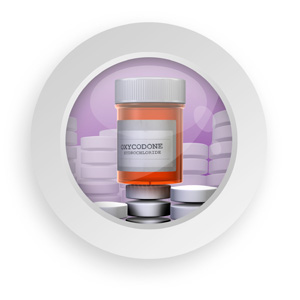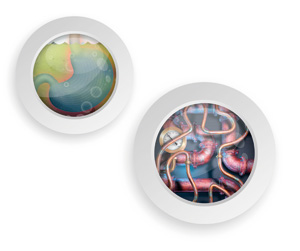 View / Download pdf version of this article
View / Download pdf version of this article
1. Think twice before you prescribe oxycodone
There is a significant problem in New Zealand with oxycodone misuse and addiction. General practice is leading the way
in reducing unnecessary use of this medicine, but there is still room for improvement. Oxycodone is a strong opioid, approximately
twice as potent as morphine (oral preparations), and there is little indication for prescribing it in a community setting
to manage non-malignant pain. If a strong opioid is necessary, morphine is the first-line choice, used at the lowest effective
dose for the shortest possible time. READ
MORE
2. Consider whether you can manage a patient with chronic non-malignant pain without opioids
The problem with chronic pain is that patients just want you to fix it…now. It is tempting for both the patient and doctor
to see an opioid as being a fast solution to this problem. However, pain is more complex than just a physical sensation,
and the psychological and social factors that influence pain can also be used as a way to manage pain. For many patients,
learning to understand their pain and accepting that “fixing it” may not be a realistic outcome will help them to cope.
Exercise, cognitive behavioural therapy, non-opioid analgesics such as paracetamol and NSAIDs, and adjuvant medicines such
as tricyclic antidepressants, are all options for managing chronic non-malignant pain. Current opinion is that opioids
have a very limited role in the management of patients with chronic non-malignant pain. READ MORE

3. Practice the principles of antimicrobial stewardship
New Zealand has one of the highest levels of antibiotic use per capita in the Western world, resulting in increasing
rates of antibiotic resistance and less effective treatment for infectious diseases. Antimicrobial stewardship is about
taking responsibility for the use of antibiotics and following a guiding set of principles to ensure we get the most out
of what antibiotics we have left. It’s about using the right antibiotic (matching sensitivity, avoiding broad spectrum
antibiotics where possible), at the right time (correct duration of treatment, avoid repeated or prolonged courses) and
for the right patient (is an antibiotic indicated for the condition being treated? Will it resolve without treatment?).
READ MORE
4. Topical antibiotics should be used for very few indications only; predominantly localised
areas of impetigo
Topical antibiotics are often used excessively, however, there are very few reasons that they should be prescribed. Fusidic
acid can be considered for treating localised areas of impetigo caused by Staphylococcus aureus, Streptococcus
pyogenes or other related streptococci. Fusidic acid is occasionally used as part of a decolonisation regimen in patients
with recurrent S. aureus abscesses. Mupirocin is used if the isolate is found to be resistant to fusidic acid
(and sensitive to mupirocin). Good skin hygiene (e.g. managing skin conditions, treating dry skin) and general infection
control measures (e.g. avoiding sharing personal care items) is essential for reducing skin infections.
READ
MORE
5. Optimise prescribing in older people; consider treatment goals and benefits vs. risks when
changing a patient’s medicine regimen
Polypharmacy can be appropriate and beneficial for patients, however, it also increases the risk of problematic prescribing
and adverse health outcomes. Older people are especially vulnerable to the adverse effects of taking multiple medicines.
Review the patient’s medicine regimen regularly and consider whether each medicine is still needed and if the goals of
treatment are still being met; consider involving a pharmacist in this review. Check that the patient is taking their medicines
as prescribed. Also enquire about medicines/supplements the patient is taking that have not been prescribed by you. If
the benefit of a medicine is considered marginal or the risks may exceed the benefit, agree on a trial treatment period,
followed by a review. READ MORE

6. Review patients who have been prescribed PPIs long-term with a view to reducing their dose
and/or switching to “as needed” treatment
Proton pump inhibitors (PPIs) are one of the most widely used medicines in New Zealand; omeprazole was the third most
commonly prescribed medicine in 2014. It is likely that there are a significant number of patients who have been taking
PPIs for prolonged periods, often at doses that are not necessary. PPIs should not be prescribed indefinitely, without
review. After initial symptom control as been achieved, down titration of PPIs (both in dose and frequency, e.g. alternate
day dosing) is often possible. Rebound acid secretion can occur when PPIs are withdrawn but this can usually be managed
with antacids, and levels generally return to normal within two weeks. READ MORE
Finally, an essential practice point that will lead on to prescribing decisions:
ABPI is a non-invasive, low cost way to detect peripheral artery disease in the lower limbs
in a primary care setting.
Peripheral artery disease (PAD) increases the risk of cardiovascular mortality by three to four times, however, the majority
of general practitioners are unable to accurately assess the extent of PAD as they do not have the necessary equipment
to do so. The ankle brachial pressure index (ABPI) can be measured in a general practice setting, using a hand-held Doppler
device and probe. This gives an indication of the patient’s artherosclerotic burden, which is the most frequent cause of
PAD. Measurement of ABPI is recommended for all patients who present with signs and symptoms of PAD and in patients who
are at an increased risk of developing PAD, e.g. older patients, smokers and those with diabetes and hypertension. READ
MORE
Other main messages covered in 2014 included:
- NSAIDs are considered the most effective analgesic for initial management of pain in people with renal or biliary colic READ
MORE and READ MORE
- If migraine symptoms do not resolve with paracetamol or an NSAID, change to (or add) a triptan; choose the triptan
formulation most preferred by the patient READ MORE
- Azithromycin use in New Zealand has grown considerably since subsidised access was widened. It is important that azithromycin
is preserved as a treatment for pertussis in children, chlamydia and acute non-specific urethritis, and is not used to
treat other conditions. READ MORE
- Encourage women who are pregnant to be vaccinated against pertussis to protect their newborn infant; the highest risk
period for infants is the first six months of their life READ MORE
- Treatment of irritable bowel syndrome should focus on the most troublesome symptom: diarrhoea, constipation or pain READ
MORE
- Assess all patients with diabetes for peripheral neuropathy; it is one of the most common long-term complications READ
MORE
- Patients taking statins do not require routine laboratory monitoring for adverse effects, unless symptomatic READ
MORE
- Detect and treat glaucoma early; ideally all patients aged over 45 years (or earlier for those with risk factors) should
be encouraged to have an eye examination, including an assessment of their optic nerve READ MORE
- Detect and treat Parkinson’s disease early; combination levodopa medicines should be initiated in patients aged over
40 years as soon as they display significant symptoms. The role of the general practitioner is to ensure that patients
are referred for diagnosis and assessment early. READ MORE
- Dry skin can be a significant burden to older people; it is a cause of dermatitis, chronic wounds and infection. Assess
skin health periodically, and encourage regular use of emollients to reduce these risks. READ MORE
“Watch this space” Headlines
- Intranasal fentanyl is increasingly being used in children for the management of acute moderate to severe pain; could
this be something for the general practice cupboard? READ MORE
- Rotavirus has been added to the National Immunisation schedule for infants from age six weeks. Uptake and impact will
be monitored over the next few years. READ MORE
- There is increasing focus on managing obesity and encouraging physical activity to underpin all health targets READ
MORE
- Effective communication with patients enhances care and increases self-efficacy, therefore improving health outcomes READ
MORE
- Faecal antigen test has been identified as the “best test” for investigating H. pylori; ensure patients are
not taking PPIs when requesting this test READ MORE
 Make your own quick reference guide to 2014 by building your own journal of key
messages: “Build My bpac” – available to My bpac subscribers, sign up for your free account at: bpac.org.nz/signup
Make your own quick reference guide to 2014 by building your own journal of key
messages: “Build My bpac” – available to My bpac subscribers, sign up for your free account at: bpac.org.nz/signup